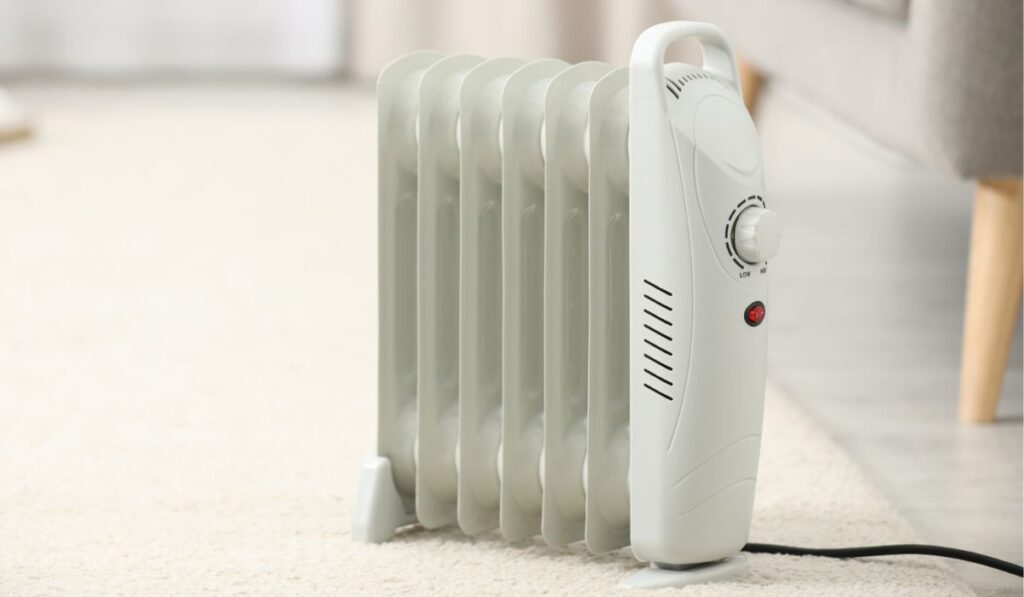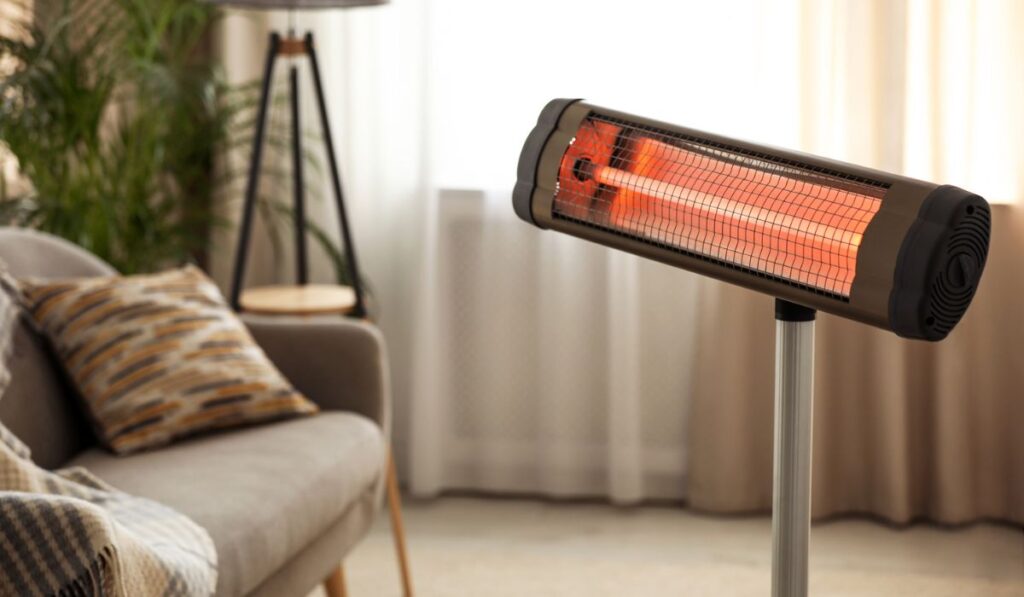In the winter months, sometimes the HVAC system isn’t enough to heat the house well — or you might discover that your bills are too high, and you want to find an alternative heating system. That’s why many people buy a space heater, which is easy to bring out and use for some extra heat when temperatures dip. But how much electricity does a space heater use?
How much electricity a space heater uses depends on the heater you buy. Most space heaters use around 1,500 watts, but the smaller ones can use as little as 200. If the electricity use concerns you, opt for a smaller model and be sure to calculate how much it’ll cost per hr of use before you buy.
Let’s take a closer look at how much electricity a space heater uses, the different types of heaters, and how you can calculate the cost of using one in your home.
How Many Watts of Power Does a Space Heater Use?

Most space heaters are around 1,500 watts. That means they use 1.5 kilowatts of power, since 1,000 watts is a kilowatt. Some smaller models use much less than that, however, so you need to look at a heater’s specs for the most accurate answer.
How to Determine How Much Electricity Your Space Heater Will Use
Most people are concerned about how much power a space heater will use because they’re worried about the cost of their electricity bill (especially if it’s being used in addition to the central heating system).
Fortunately, there’s a simple formula you can use to check if buying a space heater is affordable for you in the long run. First, you need to find out how many watts it will use.
Multiply the watts on your heater by the hours you plan to use it. So, for example, if you’re going to have it on for 6 hours, you would calculate as follows:
1,500 x 6 = 9,000
Then, divide this number by 1,000.
9,000 / 1,000 = 9
This is how many kilowatts the heater will use.
How Much Will It Cost to Heat Your Space?
Now that you know how many kilowatts the heater uses, you’ll want to know how you find out the actual cost. To do so, multiply whatever number you get by what your electricity company charges per kilowatt. This can vary widely between companies and different areas, so be sure to ask if you’re not sure.
It can also even vary by the time of day. For example, some electricity companies have what’s known as peak hours, where you get charged less for using electricity at a specific time. Often, this is in the middle of the night.
However, for safety reasons, it’s best not to leave your space heater running all night. It can be a fire hazard.
What Size Space Heater Is Best for Your Home?
Now that you know how to calculate how much electricity your space heater will use, it’s time to figure out which one’s best for your home. Here are some factors to consider:
Room Size
The general rule is 10 watts per square foot of the space you want to heat. You can calculate the square footage of a room by multiplying the length and width in feet. Then you can look at the specs of the space heater to ensure it’ll provide at least 10 watts per square foot. If you buy any less, the room probably won’t be warm enough.
You also have to consider the room itself, though. It should be well-insulated, because if the heat is leaking, you will need more power to get it to the desired temperature.
If your space heater is going to be a long-term investment, consider sealing up any cracks around the windows and doors to ensure you get the most for your money, or you may struggle to stay warm on a budget.
Heating Use
The best heating option also depends if you’re using your space heater for supplemental heat or starting from scratch. If the room is already freezing cold, it will take much more power than if the space heater supplements the central heat.
For the most part, if you have a well-insulated room and are using the space heater supplementally, 10 watts per square foot should be ideal. However, if you have other factors, adjust accordingly and make an educated guess.
Different Types of Heaters
There are also different types of space heaters that you need to consider before making a purchase. Let’s explore the two most common options:
Convection Heaters
Convection heaters, like the De’Longhi Convection Panel Heater (on Amazon), heat the air around the room. The heat is dispersed with a fan, and the rule of 10 watts per square foot applies. These are a common type of space heater that you might see.
Infrared Heaters
Infrared heaters, like the Duraflame Fireplace Stove (on Amazon), are a little different, and the 10 watts per square foot doesn’t apply. These heaters directly heat people and objects in the space rather than dispersing hot air. This is the heat the sun gives off, and despite many misconceptions, it’s perfectly safe.
Which Type of Heater Should You Buy?

So now that you’re aware of the two different types, you might be wondering if you should buy a convection or an infrared heater.
Advantages of a Convection Heater
- Because convection heaters are the most common space heater, there’s a lot of competition in production. That means they tend to be the most affordable space heaters, with a low upfront price.
- You can generally shop around to find one that suits your budget and may even be able to find some secondhand.
- They’ll heat the room much more quickly than an infrared heater. So if you want to heat up fast, they’re the right choice.
- They’re pet-safe, as they don’t tend to be hot to the touch. So those curious hands and paws won’t get burned if they get too close (on most models, anyway, but you should always be cautious despite the safety element).
- They tend to come in more models, options, and colors. So if you’re concerned about the aesthetics of a space heater, you can find a convection heater that suits your home.
Disadvantages of a Convection Heater
- Convection heaters work best in insulated rooms. If you have windows with cracks around the edges or open doors, the heat will leave the room fast, and you’ll struggle keep up the temperature in the room. Make sure you check out the room you plan on using it in before making your purchase.
- Because of quick heat loss, the low initial price is often offset by the high running costs. So, if your electricity bill is your main concern, this may not be the right one for you.
- You’ll need to adjust them relatively often. They’re not great at keeping a constant temperature, and the room may be too hot for you after a while.
Advantages of an Infrared Heater
- The heat will last on an infrared heater. So you shouldn’t need to be messing with the controls or wondering where all the heat is going, even if you have places in the room where it could escape.
- They run silently. Whereas convection heaters tend to be a little noisy, you won’t notice the infrared heater is there.
- They’re much cheaper to run. So if you’re worried about your electricity bill, then you should know it will be much more affordable with one of these than with a convection heater.
Disadvantages of an Infrared Heater
- An infrared heater has a much higher upfront cost. If you’re on a budget, that cost may be too far out of your range — and there’s much more competition than with convection heaters, so it’s harder to score a good deal.
- There tends to be just one power setting, with no option to adjust the temperature if it gets too hot or cold.
- Infrared may not be the best option if you have pets or kids that may get too close. The surface of an infrared heater can get extremely hot, and touching it can cause burns. If you want your heater to be out of reach from kids and pets, consider investing in a tabletop space heater.
Conclusion
So, the best heater for you depends on your personal needs and preferences. If you want plenty of customization options and a low upfront cost, then a convection heater may be best.
However, if you’re prepared to pay more at the start for a low electricity bill later and can keep kids and pets away from the hot surface, an infrared heater is likely the right choice.
Consider the pros and cons when deciding, and you can’t go wrong. And don’t forget to take some calculations to find out just how much the bill will be, particularly if getting a convection heater, where the costs are pretty easy to calculate.
